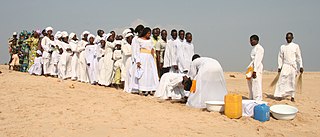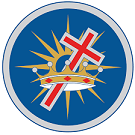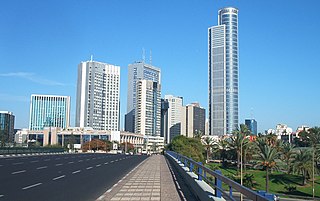
Zionism is an ethno-cultural nationalist movement that emerged in Europe in the late 19th century and aimed for the establishment of a Jewish state through the colonization of a land outside of Europe. It eventually focused on the establishment of a Jewish homeland in Palestine, a region corresponding to the Land of Israel in Judaism, and of central importance in Jewish history. Zionists wanted to create a Jewish state in Palestine with as much land, as many Jews, and as few Palestinian Arabs as possible. Following the establishment of the State of Israel in 1948, Zionism became Israel's national or state ideology.

Habonim Dror is the evolution of two Jewish Labour Zionist youth movements that merged in 1982.

The Uganda Scheme was a proposal by British Colonial Secretary Joseph Chamberlain to create a Jewish homeland in a portion of British East Africa. It was presented at the Sixth World Zionist Congress in Basel in 1903 by Theodor Herzl, the founder of the modern Zionist movement. He presented it as a temporary refuge for Jews to escape rising antisemitism in Europe. The proposal faced opposition from both the Zionist movement and the British Colony.

East Africa Protectorate was a British protectorate in the African Great Lakes, occupying roughly the same area as present-day Kenya, from the Indian Ocean inland to the border with Uganda in the west. Controlled by the United Kingdom in the late 19th century, it grew out of British commercial interests in the area in the 1880s and remained a protectorate until 1920 when it became the Colony of Kenya, save for an independent 16-kilometre-wide (10 mi) coastal strip that became the Kenya Protectorate.

The World Union of Jewish Students is the international, pluralistic, non-partisan umbrella organisation of independent Jewish student groups in 38 countries. The World Union of Jewish Students (WUJS) aims to connect, represent, and empower Jewish students globally, promoting the unity and participation of these students in advancing the Jewish people's aspirations, continuity, and cultural heritage.
Zionist churches are a group of Christian denominations that derive from the Christian Catholic Apostolic Church, which was founded by John Alexander Dowie in Zion, Illinois, at the end of the 19th century. Missionaries from the church came to South Africa in 1904 and among their first recruits were Pieter Louis Le Roux and Daniel Nkonyane of Wakkerstroom who continued to evangelize after the Zionist missionaries left in 1908.
The Yeshiva College of South Africa, commonly known as Yeshiva College - and formerly known as Yeshivat Bnei Akiva - is South Africa’s largest religious Jewish Day School. The school is headed by Mr Rob Long since 2018; the Rosh Yeshiva is Rabbi Nechemya Taylor as of 2021.

An African-initiated church (AIC) is a Christian church independently started in Africa by Africans rather than chiefly by missionaries from another continent.

The Apostolic Faith Mission of South Africa (AFM) is a classical Pentecostal Christian denomination in South Africa. With 1.2 million adherents, it is South Africa's largest Pentecostal church and the fifth largest religious grouping in South Africa representing 7.6 percent of the population. Dr. Isak Burger has led the AFM as president since 1996 when the white and black branches of the church were united. It is a member of the Apostolic Faith Mission International, a fellowship of 23 AFM national churches. It is also a member of the South African Council of Churches.
The Mau Escarpment is a fault scarp running along the western edge of the Great Rift Valley in Kenya. The top of the escarpment reaches approximately 3,000 m (10,000 ft) above sea level, and is over 1,000 m higher than the floor of the Rift Valley.

The Diamond industry of Israel is an important world player in producing cut diamonds for wholesale. In 2010, Israel became the chair of the Kimberley Process Certification Scheme. As of 2016, cut diamonds constituted 23.2% of Israel's total exports and they were the country's biggest export product, amounting to 12% of the world's production.

The Jewish Territorial Organisation, known as the ITO, was a Jewish political movement which first arose in 1903 in response to the British Uganda Scheme, but only institutionalized in 1905. Its main goal was to find an alternative territory to that of Palestine, which was preferred by the Zionist movement, for the creation of a Jewish homeland. The organization embraced what became known as Jewish Territorialism also known as Jewish Statism. The ITO was dissolved in 1925.
Yavneh Olami was an international Religious Zionist student organization that worked to inspire and educate Jewish students from the Diaspora to strengthen their connection to Israel and the Jewish People. The organization, affiliated with World Mizrachi, ran educational programs that focused on pro-Israel advocacy, Israel connectivity, leadership development, and encouraging Jewish students to make Israel their home.

Christianity is the predominant religion in Eswatini, with Protestantism being its largest denomination. The royal family of Eswatini is officially Christian.
The Yeshiva of Cape Town is a kollel and yeshiva established in 1994. Its full title is "The Rabbi Cyril and Ann Harris Yeshiva of Cape Town", named for the late Chief Rabbi. It is based in the Green and Sea Point Hebrew Congregation, in the suburb of Sea Point, Cape Town.
Green Zionism is a branch of Zionism that focuses on the environment of Israel. It fuses Israeli-specific environmental concerns with support for the existence of Israel as a Jewish state.

The history of the Jews in Zimbabwe reaches back over one century. Present-day Zimbabwe was formerly known as Southern Rhodesia and later as Rhodesia.

Hermann Kallenbach was a Lithuanian-born Jewish South African architect who was one of the foremost friends and associates of Mahatma Gandhi. Kallenbach was introduced to the young Mohandas Gandhi while they were both working in South Africa and, after a series of discussions, they developed a long-lasting association.
St. Mary's Anglican Church, a church in the Diocese of Christ the King, built at the beginning of the twentieth century, but before 1907, is one of the first churches built in Rosettenville, Johannesburg. The church was built with a quarried natural stone which was provided by Leo Rosettenstein, the township owner after whom Rosettenville was named. The building was designed by the firm of Baker and Fleming. The churchwardens continue to take good care of the building and it remains in pristine condition.
The Jacob Gitlin Library in Cape Town, South Africa is an archive of information on Judaism, Jewish culture and history, and the nation of Israel. It was founded under the auspices of the South African Zionist Federation in 1959.











